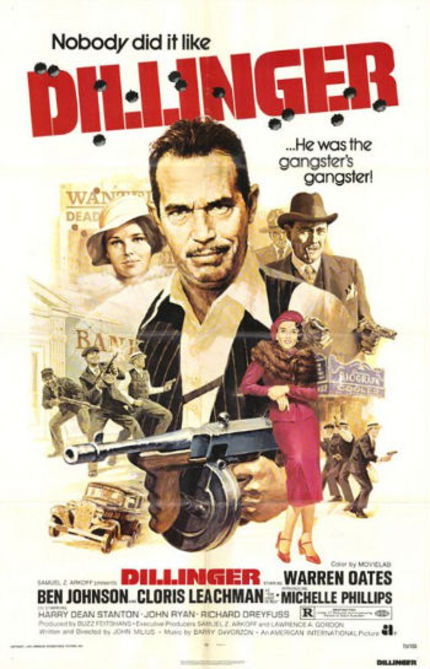70s Rewind: DILLINGER

Nine years before Conan the Barbarian, John Milius made his directorial debut with Dillinger, a jaunty yet visceral journey through the final months of Public Enemy No. 1, played by the great Warren Oates.
"I may not live forever, but I'd be a damn fool not to try."
Oates plays Dillinger with relish, as a brutish, brazen, cocky criminal who's determined to squeeze every ounce of juice out of life. A sheriff confirms his true identity by observing how he conducts himself while in disguise at a picnic, dressed in fine clothes, driving a shiny car, dancing with an indecently fine-looking woman: "Decent folks don't live that good."
Yet Milius, who also wrote the script, doesn't glamorize Dillinger or his gang. Dillinger is never "cool." The people he robs don't admire him. The townspeople don't rally to his side. He beats his ostensible girlfriend, Billie Frechette (Michelle Phillips), a heartbreakingly beautiful young prostitute he kidnaps. On the positive side of the ledge, he displays a measure of loyalty toward the members of his gang and his family. But he's not sentimental about it. And he's never repentant for his sins.
Neither are his fellow thieves, including Homer Van Meter (Harry Dean Stanton), Harry Pierpont (Geoffrey Lewis), Charles Mackley (John Ryan), Pretty Boy Floyd (Steve Kanaly), and Baby Face Nelson (Richard Dreyfus). They're a disreputable lot, without a shred of honor, instantly ready to leave behind anyone who's so badly wounded that they become a liability. They kill innocent bystanders without pause and spray rounds of bullets indiscriminately. They talk a good game, but when the chips are down, they run like hell.
The lawmen don't come off much better. Melvin Purvis, played by the great Ben Johnson, is unrepentantly eager to murder the men he holds responsible for the death of his partner. The rest of his team, who blend into a mass of three-piece suits and tommy guns, have no greater regard for human life than does Purvis.
The film alternates between Dillinger and Purvis, with Purvis filling in plot points through narration. The film covers roughly the same period of time as Michael Mann's Public Enemies, and, in any case, the story is familiar by now. Even before the Milius version, however, the Dillinger saga had been told at least five times before, the first coming in 1945, with Lawrence Tierney as the gangster. Later incarnations included Ralph Meeker (on TV) and Nick Adams (as Young Dillinger in 1965). But after watching Warren Oates, it's difficult to imagine anyone else playing the character with more grit and authenticity. The same goes for Ben Johnson as Purvis.
Released in the U.S. on July 20, 1973, Milius' Dillinger followed two other films set in the 1930s, Peter Bogdanovich's Paper Moon and Robert Aldrich's Emperor of the North. In the spare poetry of its visuals and its laconic tough-guy leads, Dillinger is much of a spiritual brother to Emperor of the North, both being hard-bitten, down to earth portrayals of the criminal element, as opposed to Paper Moon's cheerful nostalgia.
The public appetite was definitely more in favor of Bogdanovich's vision than those of Aldrich or Milius. A month later, George Lucas' American Graffiti provided a rose-eyed look back at the early 60s, and late in the year The Sting made depression-era con men look like models for the brotherhood of man.
Milius attended film school at USC and became friends with George Lucas, Francis Ford Coppola, Martin Scorsese, Brian De Palma, and Paul Schrader, among many other notables. He wrote the first draft of Apocalypse Now in 1969 (Lucas was initially attached to direct), and within two years was working on the screenplays for Evel Knievel and Dirty Harry (uncredited on the latter), followed by Jeremiah Johnson and The Life and Times of Judge Roy Bean, two tough, leathery modern takes on the classic Western.
Dillinger furthered his string of manly protagonists, a line that would stretch through the half-dozen features he directed: The Wind and the Lion (a personal favorite), Big Wednesday, Conan the Barbarian, Red Dawn, Farewell to the King (a hidden gem) and Flight of the Intruder. That's a shamefully small number of films, and a sad commentary on the state of Hollywood and the independent film community that Milius hasn't been able to get other projects off the ground.
He's continued to work as a writer, contributing his unique flavor to Jaws, Extreme Prejudice, Geronimo: An American Legend (that's two with or for the great Walter Hill, himself a great screen writer), Clear and Present Danger, and others, and also shared credit for creating the HBO TV series Rome.
But if you think it's a good thing that his right-wing, conservative, militaristic fervor has been kept off movie screens for the past two decades, take a look at Dillinger, at its classic framing, the angular muscularity of the action scenes, the precise power of the performances, and the cumulative effect of watching a familiar story unfold with relaxed ease even as the tension remains tightly-coiled.
Not many people can direct movies like that, and Dillinger held out the promise that that particular talent had a great many more interesting, imperfect, intriguing visions still up his sleeve.
Dillinger is available for viewing via Netflix instant streaming for our readers in the U.S. It's also available at a bargain price on Region 1 DVD from online vendors.







